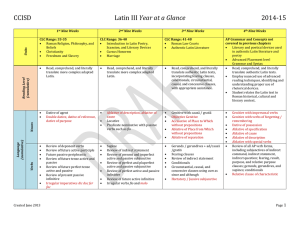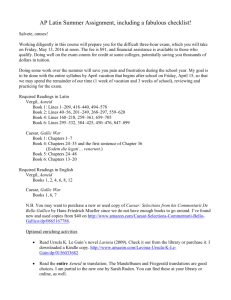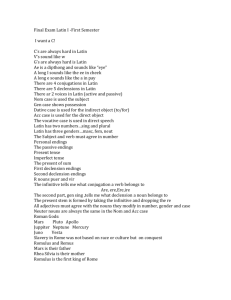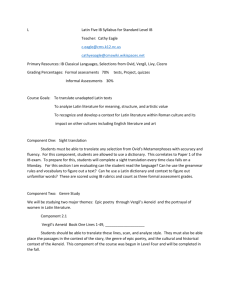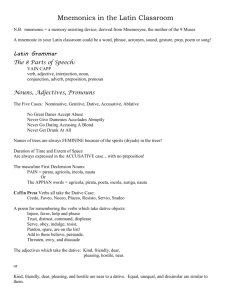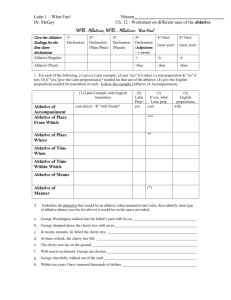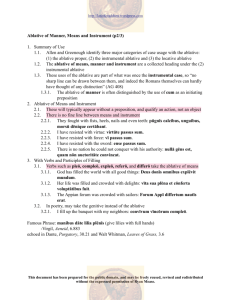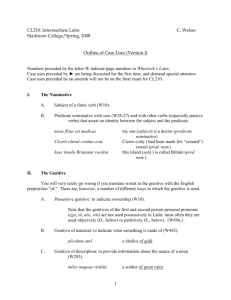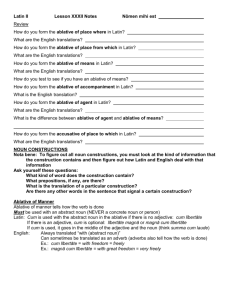AP Latin/Honors Latin 5 Course description Why AP Latin? As you
advertisement
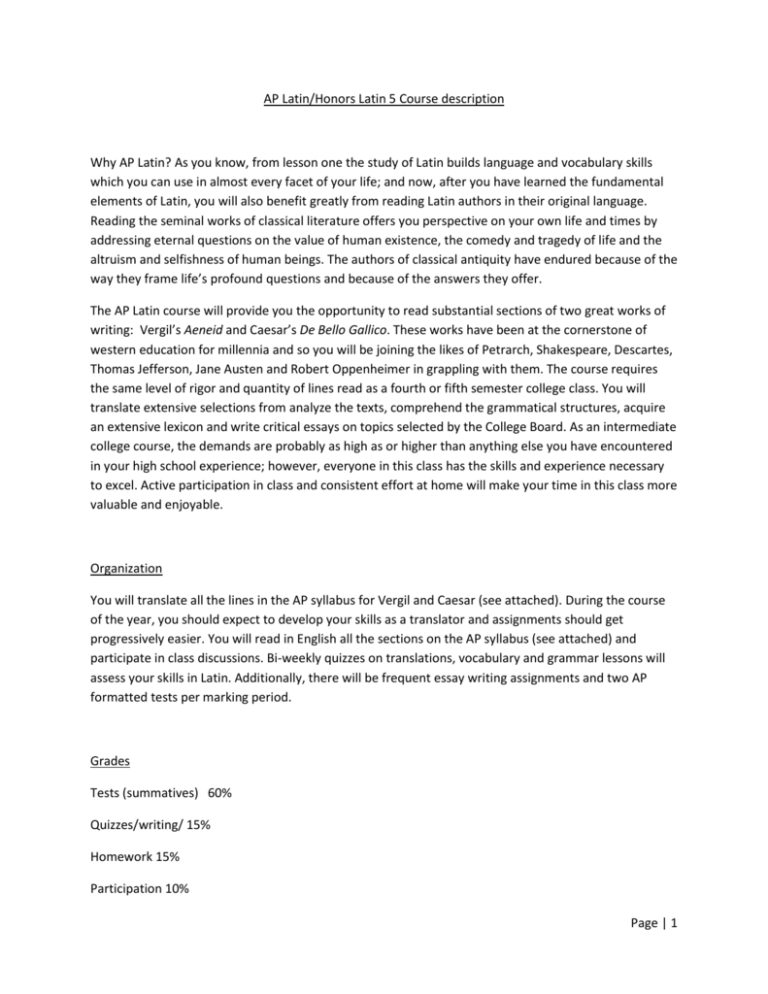
AP Latin/Honors Latin 5 Course description Why AP Latin? As you know, from lesson one the study of Latin builds language and vocabulary skills which you can use in almost every facet of your life; and now, after you have learned the fundamental elements of Latin, you will also benefit greatly from reading Latin authors in their original language. Reading the seminal works of classical literature offers you perspective on your own life and times by addressing eternal questions on the value of human existence, the comedy and tragedy of life and the altruism and selfishness of human beings. The authors of classical antiquity have endured because of the way they frame life’s profound questions and because of the answers they offer. The AP Latin course will provide you the opportunity to read substantial sections of two great works of writing: Vergil’s Aeneid and Caesar’s De Bello Gallico. These works have been at the cornerstone of western education for millennia and so you will be joining the likes of Petrarch, Shakespeare, Descartes, Thomas Jefferson, Jane Austen and Robert Oppenheimer in grappling with them. The course requires the same level of rigor and quantity of lines read as a fourth or fifth semester college class. You will translate extensive selections from analyze the texts, comprehend the grammatical structures, acquire an extensive lexicon and write critical essays on topics selected by the College Board. As an intermediate college course, the demands are probably as high as or higher than anything else you have encountered in your high school experience; however, everyone in this class has the skills and experience necessary to excel. Active participation in class and consistent effort at home will make your time in this class more valuable and enjoyable. Organization You will translate all the lines in the AP syllabus for Vergil and Caesar (see attached). During the course of the year, you should expect to develop your skills as a translator and assignments should get progressively easier. You will read in English all the sections on the AP syllabus (see attached) and participate in class discussions. Bi-weekly quizzes on translations, vocabulary and grammar lessons will assess your skills in Latin. Additionally, there will be frequent essay writing assignments and two AP formatted tests per marking period. Grades Tests (summatives) 60% Quizzes/writing/ 15% Homework 15% Participation 10% Page | 1 The course is organized around the following seven themes: 1. 2. 3. 4. 5. 6. 7. Literary genres and styles Roman values War and Empire Leadership Views of non-Romans History and memory Human beings and the gods AP Grammar and Syntax The following terms can be used on the exam to formulate questions. 1. 2. 3. 4. 5. 6. 7. 8. 9. 10. 11. 12. 13. 14. 15. 16. 17. Modifies, is dependent on, complements, antecedent Relative clause Gerundive, gerund, supine Passive periphrastic (Cambridge calls it “gerundive of obligation”) Mood Purpose clause, result clause, fear clause, relative clause of characteristic*, relative clause of purpose* Indirect statement Indirect command and indirect question Conditionals Imperatives Hortatory or iussive subjunctive (Cambridge calls it independent use of the subjunctive). Deponent verbs Genitives—possession, partitive genitive (Cambridge calls it genitive of the whole), with impersonal verbs*, with adjectives, with verbs of remembering and forgetting. Datives-dative of agent (with passive periphrastic), dative of possession, dative of purpose, dative of reference*, dative with special verbs, dative with compound verbs Accusative-duration of time and accusative of respect Ablative-ablative absolute, ablative of time when, ablative of time within which, ablative of cause, ablative of respect/specification*, ablative of comparison, ablative of degree of difference*, ablative of separation*, ablative of description*, ablative with special verbs Vocatives *concept not introduced before AP Latin/Honors Latin 5 Page | 2 Literary devices Unit 1. Book 1 of the Aeneid Entire book in English. Lines 1-209 (invocation-both Aeneas’ speeches and killing of the deer) 418-440 (Aeneas coming upon Carthage, Tyrians are like bees, temple) 494-578 (arrival of Dido and Ileonus asks for help) August 28 August 29 August 30 September 3 September 4 September 6 quiz 1 Aeneid 1.1.18 Aeneid 1.19-33 Aeneid 1. 34-49 Aeneid 1.50-64 Aeneid 1.65-80 Aeneid 1. 81-101 September 9 September 10 September 11 September 12 September 13 1.101-119 1.120-131 1.132-157 1.158-179 1.180-197 September 16 September 17 September 18 September 19 September 20 quiz 2 1.198-209 1.418-440 1.494-512 1.513-545 1.546-66 September 23 1.567-78 Quiz every Friday—translation of a seen passage, vocabulary and a grammar question. End of unit test—September 30 and October 1 Page | 3 Format follows AP test—translate a selection from the above Short answer section from selection above Essay on selection from above Multiple Choice from a seen and unseen section. Page | 4
